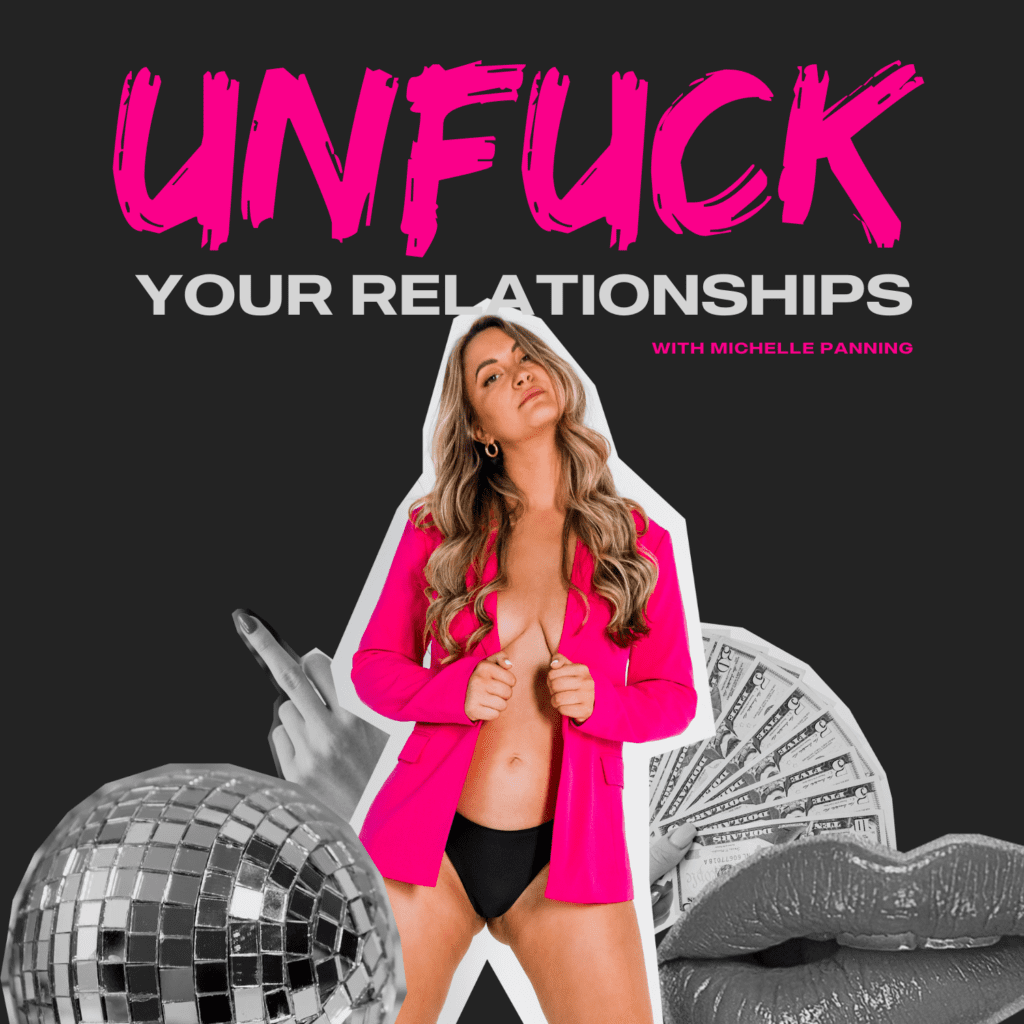What’s Yours is NOT Mine: The Shadowy Side of Taking Responsibility
September 11, 2023
Hello, my loves. Welcome back to Unf*ck Your Relationships. We’re going to be talking about the shadowy side of taking responsibility today.
I was on a mastermind call with one of my mentors recently, and I was talking about friendship and relationships in general, and my mentor was reflecting to me that something I’ve really nailed over the last six months is knowing what is mine and what is someone else’s in any situation.
However, this didn’t happen overnight. There’s a certain level of maturity that needs to be gained in order for you to see what’s yours and what’s theirs. Up until recently, the way I went about taking responsibility—or avoided taking responsibility—looked a lot different.

All or Nothing
So, just a little backstory. Before personal development, absolutely nothing was ever my fault. I started out playing the victim. I wasn’t taking responsibility in anything. The world was against me, life was so hard, yadda yadda yadda. You get the gist.
But after I started personal development work, I actually went to the complete opposite side—particularly when I started doing shadow work and started to see how everything that I was judging in everybody else was also within me. And even if I wasn’t actively doing that thing, I had the capacity to play into that characteristic.
After recognizing that, I started taking responsibility for everything. Which…honestly, at the beginning, that served me so, so, so well, because there was a lot of shit that I actually had to clean up in my world.
For instance, I could look at my anxious avoidant attachment style and say, “I’m just like this because of my parents.” And I mean…yeah, maybe, but taking responsibility to do the work to cultivate a secure attachment style is still important. You don’t get to cry about being anxious-avoidant and do nothing about it, because then I don’t feel sorry for you.
So at first, taking responsibility for everything was super, super beneficial.
But what ended up happening was, after a solid six months of identifying projections I was putting on others and taking responsibility for them, I couldn’t really see what was mine and what was someone else’s. Anytime that I made a judgment about someone or anytime that someone else behaved poorly, I would immediately put it back on to me and say, “Cool. So how have I influenced this? What did I do to make this happen?”
And like I said, there’s benefit to that in the beginning, because we do need to see how we’re playing a part in certain things. For example, if someone’s being really avoidant, it’s useful for us to see where we’re potentially being anxious. Or, if someone is being anxious, where are we potentially being avoidant? How are we influencing that dynamic?
Another example: if you think someone is acting like a victim, it’s useful to stop and ask, “Are they acting like a victim, or am I just uncomfortable with their vulnerability?”
These are all super useful things, but after a while, that assessment becomes so integrated that you can very easily see your part in things, but seeing where others are responsible is harder.
From Victim to Villain
So, let’s break this down from the beginning.
Most people come into personal development with a very victim-heavy mindset. They come from this space of, “I don’t like something in my life. Something needs to change. I don’t know how to change it. The world is against me.” There tends to be a flavor of not wanting to commit to taking responsibility, even if you think you are not completely in the right.
Then, as we start to learn about triggers, projections, shadows, patterns, all of those things, there’s often an overcorrection in the form of a pendulum swing to the other side, where you start taking responsibility for everything.
Now, neither of those spaces—the victim avoiding taking responsibility or the martyr taking responsibility to an extreme—are inherently bad places to be in your life. We can only find equilibrium when we have lived embodied experience of what both sides feel like.
So while there does tend to be this overcorrection to being overly responsible, that actually needs to happen, because you need to see where you have influenced or co-created certain situations. You need to see that it’s not you against the world, it’s you in collaboration with the world.
You don’t want to lose that space of recognizing where you need to be taking responsibility when you come back into the equilibrium of seeing what is yours and what belongs to others.
However, what tends to happen is that people can either get stuck in the victim mindset, where they’re like, “Nothing is my fucking fault, I don’t have a part to play in this, you’re avoidant, and if you could just sort your shit out, we’d be good,” and of course, none of their relationships ever fucking work out (surprise, surprise). Or people get stuck on the other side, where they’re taking responsibility for everything and then gaslighting themselves for shit that isn’t actually theirs.
So, the latter looks like this: you’re communicating very, very clearly, you’re being vulnerable, you’re speaking your needs, you’re using nonviolent communication, you’re coming from a very integrated, calm, regulated space…and the other person is still flying off the handle.
In this case, it’s actually not helpful for you to say, “Okay, how could I be better? How am I influencing that?”
If that’s happening on a regular basis, maybe the only thing you need to be taking responsibility for is staying in a dynamic where this person is not receptive to clear and honest adult communication. Maybe the thing you need to be taking responsibility for the fact that you should probably leave that relationship.

Leave the Dance
The point that I want to make here is just how important it is to be aware and to actually see what’s yours and what’s theirs. Because if you aren’t able to do that, that’s where people get into abusive situations, because they’re constantly taking responsibility for the other person’s bad behavior. They keep telling themselves that if they could just show up differently, maybe that person wouldn’t do that anymore.
Maybe he’d treat them better if they could just stop stepping on his toes so much. If they could just be more organized at home, or maybe if they spoke differently.
Ugh. No. We need to stop excusing other people’s poor behavior.
And again, there’s such duality and discernment in this, because we can look at our part, but when someone’s behaving a certain way and you’ve tried all the things and nothing’s shifting…maybe that’s actually not a you thing. Maybe the you thing is fucking leaving that relationship. Maybe the you thing is walking away. And that’s a tough pill to swallow, because we don’t want that to be the thing. We want another communication technique. We want a fix.
But I truly believe that it takes two to tango. If someone’s genuinely not receptive, there’s not a lot we can do.
Sometimes our lesson is learning that it’s not our lesson to learn.
Does that make sense? We have to stop sometimes and recognize, “This isn’t my lesson.” And that’s actually our lesson.
We need to learn to acknowledge when it isn’t our dance. It isn’t our pattern. Instead, maybe our pattern is to always be taking responsibility for other people’s shit.
At that point, we have a choice: do we want to continue to play into that pattern, or do we want to transcend that right here, right now?

Reaching Equilibrium
So, if you’re wanting to have very healthy relationships with others, you have to make a choice: do you want to be responsible for every single thing that every single person ever does?
That may not be an issue once or twice, but if you do it over and over and over again, you’ll become a fucking caretaker, and you’ll completely lose yourself.
It’s the same thing if you’re avoiding taking responsibility for anything. In one situation, it might not matter, but if you do that over and over and over again, you’ll wake up one day to find that you’ve become this fucking victim to life and circumstance.
So in the end, this is all about coming back to equilibrium and being able to identify what’s yours and what’s theirs.
This is why I love being connected to my body and why I preach it so fiercely, because when it came time recently for me to discern what was mine and what was someone else’s, I could feel in my body that the thing wasn’t mine. And while that hurt and there was grief there, it was also freeing to know that there was nothing more for me to do there. So I encourage you to start examining where you’re not taking responsibility like you should be, but also recognize where you’re taking too much.
WORK WITH MICHELLE:
Join The Connected Woman EXPERIENCE: https://michellepanning.com/the-connected-woman-experience
Ready to do the work? You can find all courses, masterclasses, and more right here: https://michellepanning.com/all-offers
CONNECT WITH MICHELLE:
Instagram: http://www.instagram.com/michellepanning
Website: http://www.michellepanning.com

What’s Yours is NOT Mine: The Shadowy Side of Taking Responsibility
MINDSET & EMBODIMENT MENTOR
I'm Michelle
about the host
I get it, girl. I’ve been there too. For years, I was going through the same experiences with men over and over again that left me feeling confused, anxious and pissed off.
I silenced myself in dating and relationships because I was terrified of being judged, rejected and abandoned. It all changed when I went through a break-up and thought “enough is enough. I cannot continue to repeat the same relationships with different men! Something HAS to change!”